Hi hello howdy! What’s good this week? Let’s dive in!
Well, if you’re at all tuned in to online book discourse, you know that we’re all abuzz about the list of Best Books of the 21st Century put together by The New York Times (gift article) and slowly released throughout the week. Bookstagram in particular seems to be talking about nothing else at the moment! I am loving all the conversation and all the interaction, and I have some thoughts and feelings to process in long-form with all y’all.
Let me just say– I have been obsessed with this list all week long. Immediately when I saw the public ballots on the Instagram feed of The NYT, I thought: “I can make one too!” Ah, the democratization of the internet! Within an hour or two of reading the article, I had posted my ballot on Instagram and shared a template in case others wanted to do the same… and it blew up! Hundreds (thousands?) of folks have posted ballots defining their own Best Books of the 21st century, most of them including a comment like “The NYT didn’t ask me, but here’s my ballot!” Then, on Tuesday, a page opened up on the The NYT to submit your own picks (so they literally are asking all of us!) and there will be a reader-generated list produced at the end of the week. I appreciate The NYT soliciting ballots from experts and “luminaries” first, and I am so intrigued to see what sort of overlap and divergence there is between the “official” list and the “organic” list. Y’all know I love to look at the difference between audience’s score and critic’s score on Rotten Tomatoes hahaha. But at the same time, I kind of wish they had solicited ballots from readers at the beginning of the process to create a super-merged list. In any case, it’s been such a fun ride this week!
First, the tally:
I have read 19 of the total 100.
I have marked 46 as “want to read.”
Of those 46, I already own 20.
I will remind myself (and everyone else!) that these numbers don’t mean anything about how well-read we are or aren’t. It’s just one list of some books.
Next, let’s talk about the methodology of the list.
The criteria for the list was simple: an eligible book must be published 1) in the United States, 2) in English, 3) in/after the year 2000. And “BEST” can be interpreted however you want. The NYT solicited a top ten ballot from circa 500 “big names” in literature– authors, reviewers, influencers, and other “literary luminaries.” Some even agreed to have their ballots shared publicly– including Min Jin Lee, Roxanne Gay, and Sarah Jessica Parker. The NYT then ran a series of polls amongst the group to tally total votes, and the top 100 are decided by popular vote… with some editorializing (not sure in what specific ways the editors massaged the list, but they clearly did some editing).
This methodology makes sense to me! Just gather a ton of nominations and narrow it down over time through several rounds of voting, ultimately creating a curated list that’s got majority approval. For any of ya’ll who are ultra-nerds, this is how Robert’s Rules of Order dictates the process of nominating and electing officials to an organization’s board of directors or for a committee (which is how we handle committees and boards in my denomination, so the process feels familiar and generally fair to me).
However, I do wish that The NYT had put a few more boundaries around the list, like making it explicitly a list of the best American books of the 21st century. They sort of did that by saying an eligible book needed to be published in the United States, but I wish they had explicitly stated that they were evaluating American writing. Trying to evaluate the entire world of published works is too big of a task, and the list is already verrryyy American-centric (which makes sense considering the factors of audience and participants), so I wish they had just made it explicitly an American list from the get-go.
In addition to needing some clarity and focus, I feel like the methodology let us down in terms of the diversity of the list. I’m honestly shocked by some of the snubs– specifically, having no books from either Louise Erdrich or James McBride while we had multiple books from other authors feels like an absolute crime to me. I think at one of the later stages in the voting process there should have been a run-off ballot to narrow down the multiple books by a single author down to only one. A list of only 100 books is too small to have repeat authors, in my opinion. And since the list is clearly already being editorialized a little bit, if the editors notice that the emerging list might produce some major snubs– like Maggie O’Farrell, or Lauren Groff, or Jhumpa Lahiri– then they should have added them into the mix in another round of voting to round out the candidates.
I’m not shocked that the list really doesn’t have any genre fiction, but I am still a little disappointed. I think there are some really interesting things happening with genre fiction that have totally shaped the literary landscape. And I think that different genres can offer really compelling insights into our contemporary reality in fresh ways. Like, how on earth could Gone Girl by Gillian Flynn not make a list of Best Books of the 21st Century?! And what about Game of Thrones by George R. R. Martin, or Outlander by Diana Gabaldon, or Harry Potter by J. K. Rowling? Whether these stories are personally to your taste or not, you have to admit they’re the foundation of significant cultural influence. And, in that vein, what about Bridgerton by Julia Quinn? Romance has and continues to be the most profitable genre for publishers, so just by sheer numbers it ought to be considered in some way.
The other note about methodology that I want to make is that we need to hear people’s definitions of “BEST BOOK.” I made my own ballot, and these are my best books, not everyone’s best books. And while I adamantly believe not every book is for every reader, and there really is no such thing as a “book everyone should read,” I will advocate for these books to be read by as many people who might like to at least try.
This is what I personally mean when I say this book is a “best book of the 21st century”:
When I say “this book is the best,” I mean that it demonstrates truly excellently-crafted writing and a master-level talent, creative structuring that offers a unique reading experience, compelling characters that feel real and true, careful plotting that trusts a reader to follow a story and surprises and delights us along the way. In short, it is just a really good book.
When I say this is “the best of the 21st century,” I mean that it shows nuanced portraits of contemporary (American) life, with a strong sense of place and clear commentary on the pressing issues of our time, while existing in conversation with other ongoing discourse (i.e.: other books, ideas, and conversations about our time). In short, it is clearly of the 21st century– so much so, that maybe in 100 years we might cringe at how “of-its-time” this book is.
Italo Calvino said in his essay “Why Read the Classics?” that “a classic is a book that has never finished saying what it has to say.” These are books we return to because they speak to us and keep speaking to us— in a personal way and in a collective / communal way.
So, with that criteria in mind, I did a quick pull from my shelves and made a go-with-my-gut, no-big-justification list of ten books that I would want to advocate for a spot on the list of great books of the 21st century. I have to admit that I did make one substitution from my original list at the beginning of the week to my final list at the end, as I kept thinking about the scope of this project, but I mostly avoided overthinking it. There are so many amazing novels that I passed over, which plenty of others would have nominated, but I chose ten American novels that pretty clearly represent my personal taste and my own reading life.
My submissions for “Best Books of the 21st Century: AMERICAN FICTION”
Gilead, by Marilynne Robinson: a beautiful, quiet, reflective novel framed as an old man’s long letter to his young son “so he might know his begats.”
Our Souls At Night, by Kent Haruf: a story about the ways we seek and create meaningful connection, featuring older protagonists, intergenerational relationships, and a small-town community.
The Round House, by Louise Erdrich: a coming-of-age novel meets a mystery-novel set on the reservation from a master of the craft.
Flight Behavior, by Barbara Kingsolver: a compassionate portrait of Appalachia, and a woman opening up to the beauty & wonder of the natural world as she takes control of her own life.
Salvage the Bones, by Jesmyn Ward: I don’t know if this is Ward’s best book, but it is * THE * portrait of Hurricane Katrina and a necessary inclusion on the list.
The Interpreter of Maladies, by Jhumpa Lahiri: a collection of short stories about the complexities of the immigrant experience. (*This was my last minute substitution– I had left it off originally because it was published in 1999, so technically it’s ineligible… BUT! it was awarded the Pulitzer and the PEN/Faulkner prize in 2000, which I would argue is more significant than the original publication date, so ultimately I decided to squeeze it in, because it’s my ballot, OK?!)
Sag Harbor, by Colson Whitehead: “black boys with beach houses” in the Hamptons, a slice-of-life story highlighting the tensions of race & class in America.
Mecca, by Susan Straight: a multi-ethnic, multi-generational portrait of southern California; includes a chapter that should be required reading as we suffer an epidemic of gun violence.
Caramelo, Sandra Cisneros: a wonderful romp, family saga, and cultural historiography of the Mexican-American experience from a master story-teller.
Fates & Furies, by Lauren Groff: a story of a relationship told from dual perspectives that captures the complexities of falling in and out of love and of sharing our lives with others.
Upon reflection… there are a few things I notice about my personal list:
Most of the authors represented here have been nominated or awarded prestigious literary prizes, although my personal favorite books from these authors aren’t necessarily their prize-winning books. Colson Whitehead, for example, has won the Pulitzer Prize for Fiction twice, and one of those winners is on the list (Underground Railroad), but I still think his best novel is the semi-auto-fictional Sag Harbor, because it has the most heart and soul (in my opinion). Barbara Kingsolver’s novel Demon Copperhead is one of the best books I’ve read in the past several years, and The NYT included it on the official list, but I chose Flight Behavior for my personal ballot because it holds all of Kingsolver’s best themes– from her love and concern for the people of Appalachia to her focus on environmental concerns– in a much more cohesive way than Demon Copperhead does.
I can see that in my intention to avoid recency bias, I actually only included one book from the past few years: Mecca, by Susan Straight. It’s the only book on my list that addresses the experience of the Covid-19 pandemic, and only briefly at that. I think in so many ways we’re still all processing that collective trauma and when we return to an exercise like this in 5 years, we’ll probably have a more clear idea of the best books that deal with our pandemic experiences. I think this will be HUGE for the canon of 21st century literature.
My final note about my personal selections is that only two from my list ended up on The NYT’s official list, but I’m hopeful more of these might show up on the reader-generated list coming out later– especially The Round House and Fates & Furies.
If you made it all the way to the end of this intensely bookish essay:
Thank you for sticking with me!
What are some of your thoughts about the list? How many have you read? What have you added to your TBR? What do you think I should read from this list?
That’s all for now! Thanks for tuning in! Let me know what you think about this bookish list, and let me know what’s bringing you joy this summer season. And if this content has been joyful and helpful for you, I would love for you to share it with others, and consider buying me a coffee to support my work.
With grace, peace, and much love,
Rev. Alicia




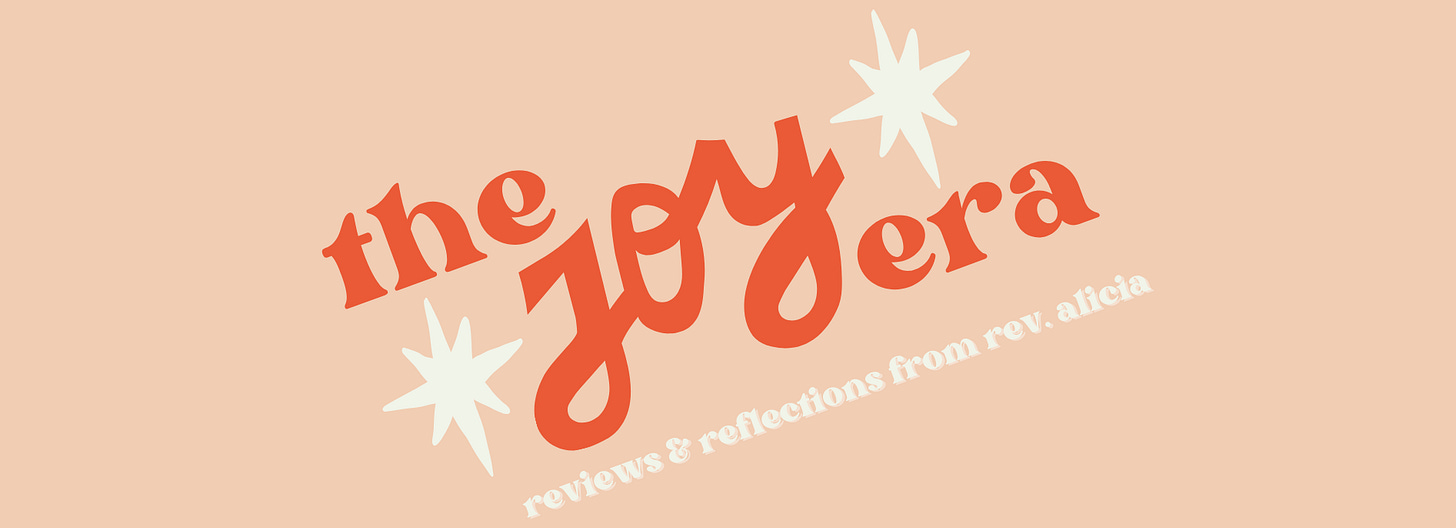
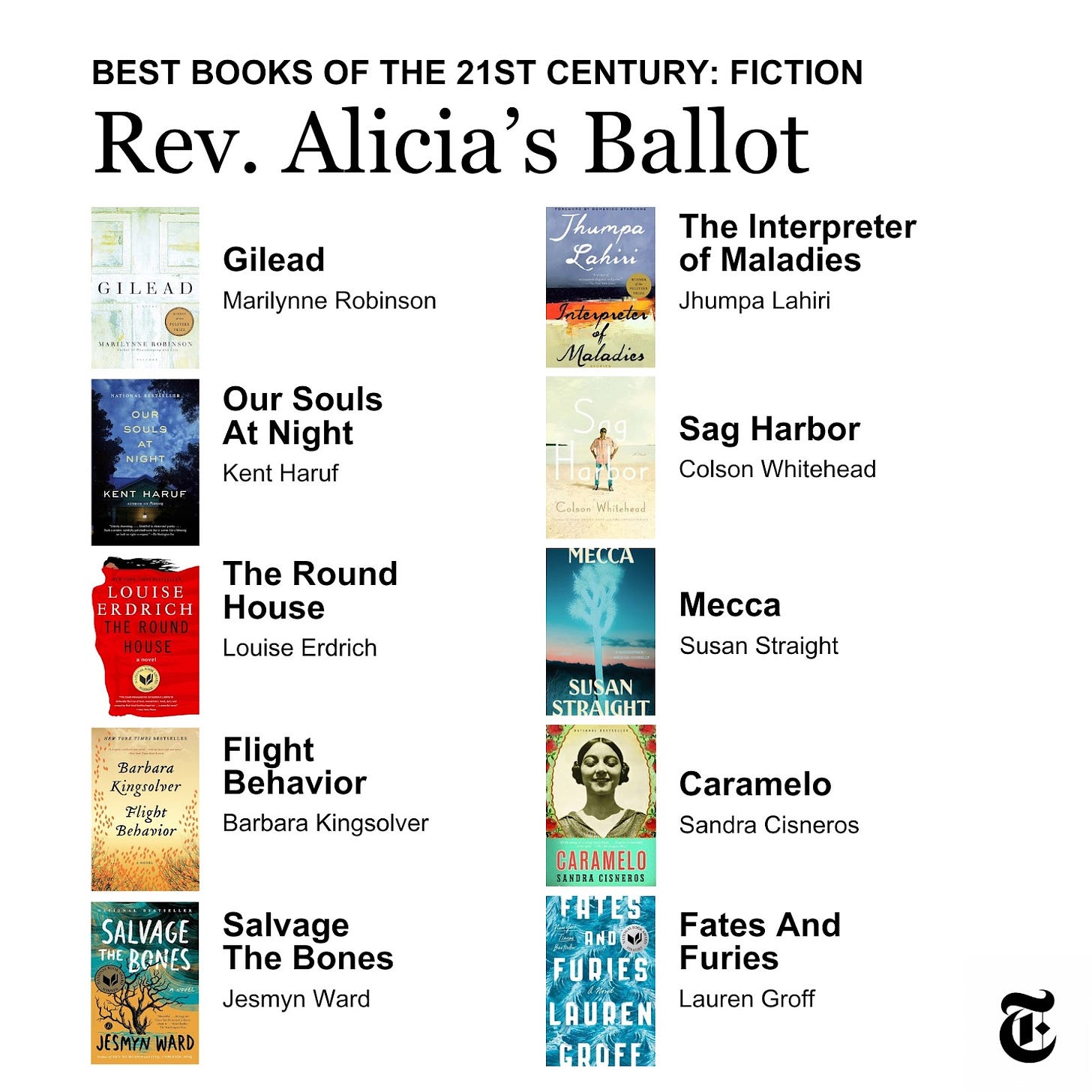
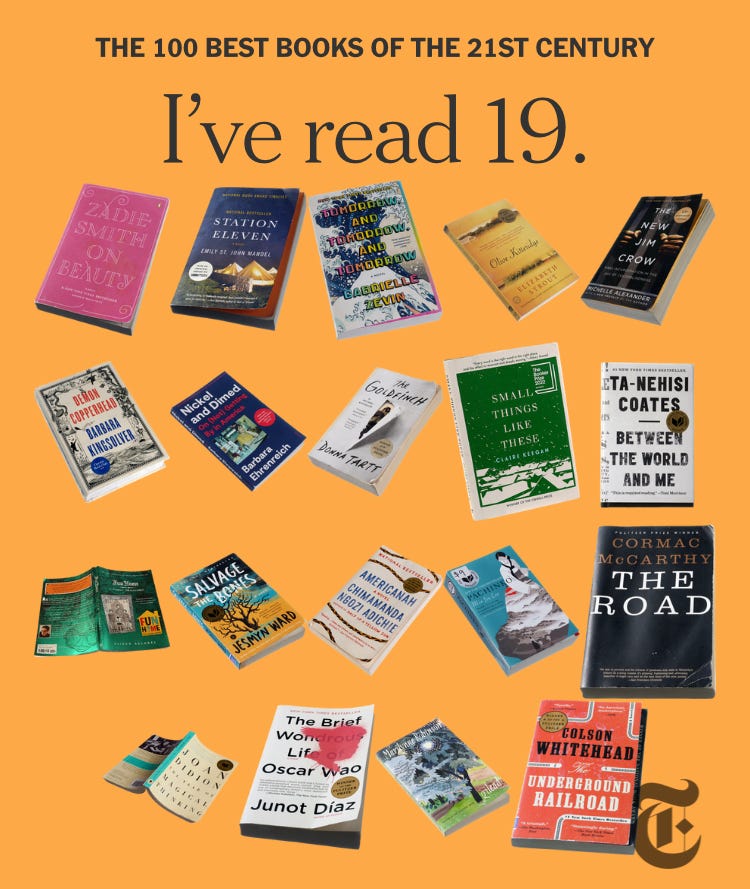
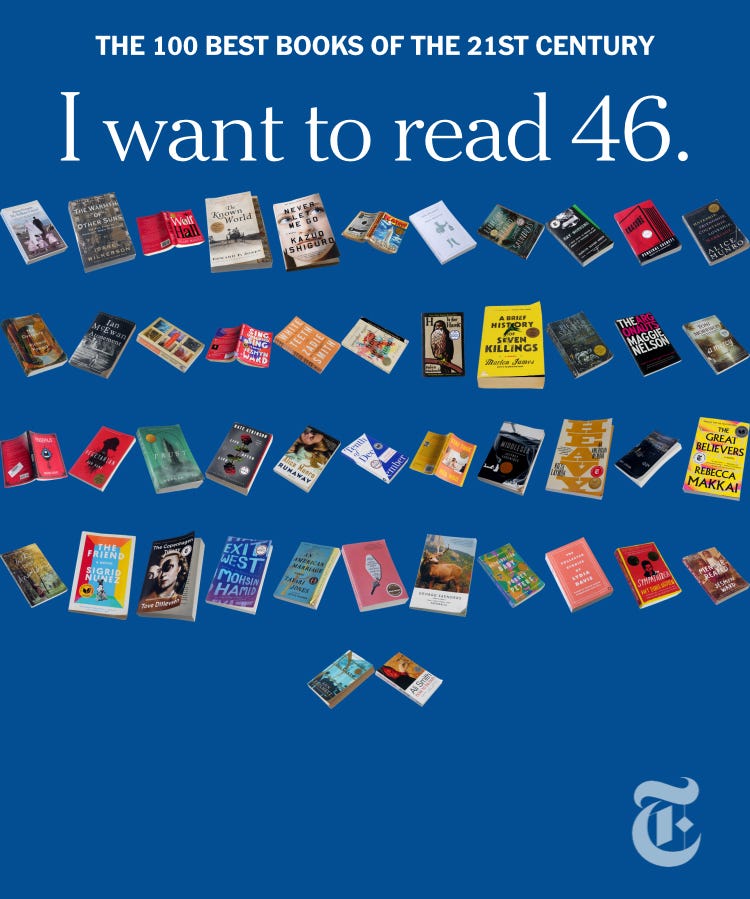
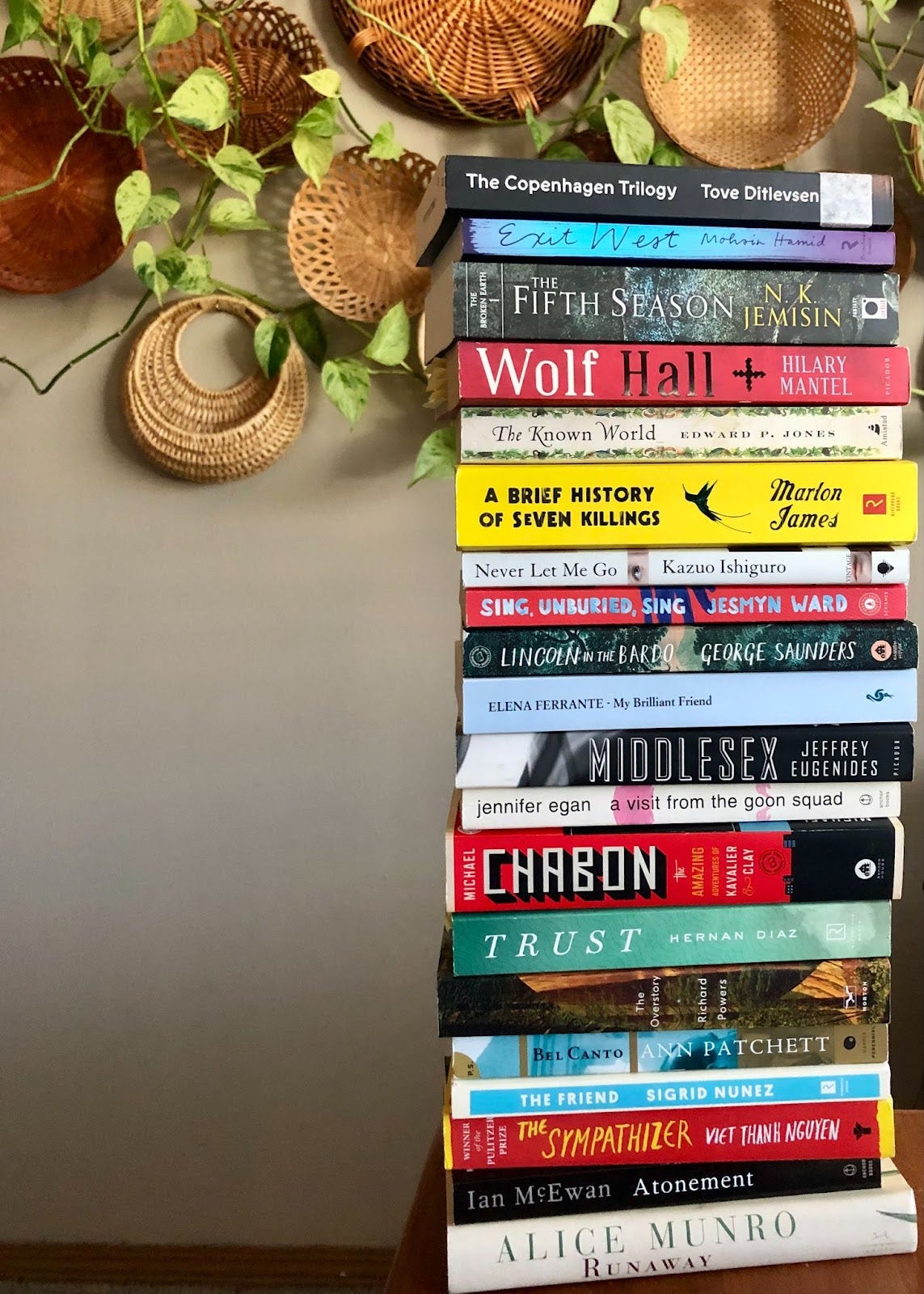
I think they should have had a separate list for nonfiction. Nonfiction really was snubbed. I agree with you about authors with multiple books on the list. I would have preferred just one title per person and then maybe we would have seen McBride and Erdrich.
I love your thoughts on the framing for your selections, and your list vibrates with mine like a true friend - we don't share any titles, but we both have Louise Erdrich, and many of your books were contenders for my list (I haven't read Mecca or Sag Harbor, but I will! (I don't know Canva, so I had to create my list on Goodreads like a dinosaur https://www.goodreads.com/review/list/185535-mary?ref=nav_mybooks&shelf=my-best-of-21st-century ) Also, I read 43 of the NYT list, and a couple of those were total duds for me (like I will never again pick up Franzen!) so I'm holding the list VERY lightly and mostly celebrating the community connections the whole thing fostered. because we needed some collective joy.